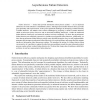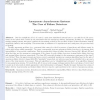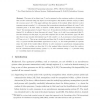124
click to vote
PODC
2012
ACM
13 years 4 months ago
2012
ACM
Failure detectors — oracles that provide information about process crashes — are an important ion for crash tolerance in distributed systems. Although current failure-detector...
119
click to vote
WDAG
2010
Springer
15 years 11 days ago
2010
Springer
Abstract. We argue that failure detectors encapsulate fairness. Fairness is a measure of the number of steps a process takes relative to another processes and/or messages in transi...
137
click to vote
WDAG
2010
Springer
15 years 11 days ago
2010
Springer
Abstract: Due the multiplicity of loci of control, a main issue distributed systems have to cope with lies in the uncertainty on the system state created by the adversaries that ar...
143
click to vote
DC
1999
15 years 1 months ago
1999
or fault-tolerant asynchronous systems. It abstracts a family of problems known as Agreement (or Coordination) problems. Any solution to consensus can serve as a basic building blo...
117
click to vote
DC
2008
15 years 2 months ago
2008
This paper determines necessary and sufficient conditions to implement wait-free and non-blocking contention managers in a shared memory system. The necessary conditions hold even...
DC
2008
15 years 2 months ago
2008
The power of an object type T can be measured as the maximum number n of processes that can solve consensus using only objects of T and registers. This number, denoted cons(T), is ...
204
click to vote
PODC
1992
ACM
15 years 6 months ago
1992
ACM
We determine what information about failures is necessary and sufficient to solve Consensus in asynchronous distributed systems subject to crash failures. In Chandra and Toueg [199...
111
click to vote
WDAG
1997
Springer
15 years 6 months ago
1997
Springer
Abstract. We study the problem of achieving reliable communication with quiescent algorithms (i.e., algorithms that eventually stop sending messages) in asynchronous systems with p...
147
click to vote
SRDS
1996
IEEE
15 years 6 months ago
1996
IEEE
In existing asynchronous distributed systems it is impossible to implement failure detectors which are perfect, i.e. they only suspect crashed processes and eventually suspect all...
105
click to vote
IPPS
2000
IEEE
15 years 6 months ago
2000
IEEE
This paper is on the Consensus problem, in the context of asynchronous distributed systems made of n processes, at most f of them may crash. A family of failure detector classes s...



